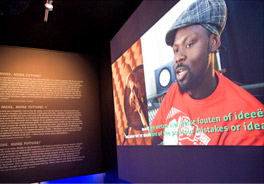HERITAGE
 Exhibition 'Indépendance' Exhibition 'Indépendance'11.06.2010 - 09.01.2011Photo Raymond Dakoua © RMCA |
'More, more, more future!' In the colonial era, Congolese artists give shape to the confrontation with the colonizers through statuettes, gourds, masks and music. They next develop other forms of expression such as the comic strip, painting, drawing, dance and urban music. 'Art for art' – art detached from daily life – which restores the work to an object of contemplation, is a recent idea in Western history and rarely encountered in Congo. Whether they have artistic training or not, Congolese artists are in general highly committed and feel invested in an 'educational' mission on behalf of the population: they often take on the role of chroniclers of Congolese society and are highly critical of the political situation and social developments. In Congo as elsewhere, while art is produced often on the fringes of society, it is also quickly appropriated: authorities attach themselves to the most popular artists in order to consolidate their power. Pop music is often ambiguous: Franco, who dominates the Congolese music scene during the Mobutu years, sings the dictator's praises, but in his songs he also doesn't hesitate to criticize the regime and Zairean society. Congolese rappers, who are currently popular in Belgium, are inspired often by African-American rappers; without necessarily knowing it well, they have become part of Congolese musical tradition, by embracing the critical role they have to play regarding politics. In this way, Banza M'Poyo Kasavubu – grandson of Congo's first president – and Teddy Lumumba – grandson of Prime Minister Lumumba – have chosen urban music rather than politics to pursue the same goal: using the power of words to change Congo. Like them, Congolese youths who grew up in Belgium can express themselves more freely than those who stayed in Congo, experienced colonial and postcolonial repression, and, like Franco, more often use indirect means to criticize the system. The popularity of Congolese music is explained not only by oral culture but also by its subversive potential: live music and lyrics that comment on daily life are more difficult to monitor and suppress than recordings. |


